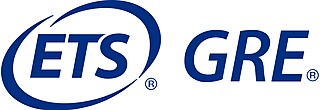
Postgraduate education, graduate education, or graduate school consists of academic or professional degrees, certificates, diplomas, or other qualifications usually pursued by post-secondary students who have earned an undergraduate (bachelor's) degree.

Admission to the bar in the United States is the granting of permission by a particular court system to a lawyer to practice law in the jurisdiction. Each U.S. state and jurisdiction has its own court system and sets its own rules and standards for bar admission. In most cases, a person is admitted or called to the bar of the highest court in the jurisdiction and is thereby authorized to practice law in the jurisdiction. Federal courts, although often overlapping in admission standards with states, set their own requirements.

The Graduate Record Examinations (GRE) is a standardized test that is part of the admissions process for many graduate schools in the United States and Canada and a few other countries. The GRE is owned and administered by Educational Testing Service (ETS). The test was established in 1936 by the Carnegie Foundation for the Advancement of Teaching.

The Universities and Colleges Admissions Service is a charity and private limited company based in Cheltenham, Gloucestershire, England, which provides educational support services. Formed on July 27th, 1993 by the merger of the former university admissions system, Universities Central Council on Admissions, and the former polytechnics admissions system, Polytechnics Central Admissions System, the company's main role is to operate the application process for British universities and colleges. The company is funded by fees charged to applicants and universities as well as advertising income.

The Ontario Universities' Application Centre (OUAC) is a non-profit organization based in Guelph that processes online applications for admission to universities in Ontario, Canada. It was founded in 1971 by the Council of Ontario Universities and the Ontario Universities' Council on Admissions, to reduce the duplication and costs involved in processing applications.

The College Board is an American not-for-profit organization that was formed in December 1899 as the College Entrance Examination Board (CEEB) to expand access to higher education. While the College Board is not an association of colleges, it runs a membership association of institutions, including over 6,000 schools, colleges, universities, and other educational organizations.
University admission or college admission is the process through which students enter tertiary education at universities and colleges. Systems vary widely from country to country, and sometimes from institution to institution.

The Examination for Japanese University Admission for International Students, more commonly referred to as simply the Examination for Japanese University Admission (EJU), is a standardized test which non-Japanese students hoping to attend undergraduate or graduate university programs in Japan are required to take and pass.
The University of Providence is a private Roman Catholic university in Great Falls, Montana. It is accredited by the Northwest Commission on Colleges and Universities.
An admissions or application essay, sometimes also called a personal statement or a statement of purpose, is an essay or other written statement written by an applicant, often a prospective student applying to some college, university, or graduate school. The application essay is a common part of the university and college admissions process.
Pre-medical is an educational track that undergraduate students in the United States pursue prior to becoming medical students. It involves activities that prepare a student for medical school, such as pre-med coursework, volunteer activities, clinical experience, research, and the application process. Some pre-med programs providing broad preparation are referred to as “pre-professional” and may simultaneously prepare students for entry into a variety of first professional degree or graduate school programs that require similar prerequisites.

College admissions in the United States refers to the process of applying for entrance to institutions of higher education for undergraduate study at one of the nation's colleges or universities. For those who intend to attend college immediately after high school, the college search usually begins in the eleventh grade with most activity taking place during the twelfth grade. Applications to many schools are due in October or November of senior year for Early Decision or Early Action, or in December or January of their senior year for Regular Decision, though the timeline may vary depending on the universities, some having an earlier deadline due to the fact that the admissions process may weigh in more on transcripts. Students at top high schools may often begin the process during their tenth grade or earlier. There are considerable numbers of students who transfer from one college to another, as well as adults older than high school age who apply to college.
Rolling admission is a policy used by many colleges to admit freshmen to undergraduate programs. Many law schools in the United States also have rolling admissions policies. Under rolling admission, candidates are invited to submit their applications to the university anytime within a large window. The window is usually over six months long, and some schools do not have a previously specified end date. The university will then review the application and notify the applicant of their decision within a few weeks from submission.

The Common Application is an undergraduate college admission application that applicants may use to apply to over 1,000 member colleges and universities in all 50 U.S. states and the District of Columbia, as well as in Canada, China, Japan, and many European countries.
The Polytechnic University of the Philippines College Entrance Test, commonly known as PUPCET, is part of the admission requirements in the Polytechnic University of the Philippines, administered to graduates of Philippine and foreign high schools. It is used to measure the capability of incoming students depending on what degree will the applicant choose. PUPCET is one of the most competitive entrance examinations in the Philippines. Of an estimated 50,000 annual entrance test examinees for the main campus in Manila, only 8,000 will be accepted due to the university's limited budget. Due to covid restrictions this temporarily suspended and implements College Admission Evaluation of Polytechnic University of the Philippines or CAEPUP.
The Common Data Set (CDS) is an annual product of the Common Data Set Initiative, "a collaborative effort among data providers in the higher education community and publishers as represented by the College Board, Peterson's, and U.S. News & World Report." The stated goal is to provide accurate and timely data to students and their families while decreasing the workload of administrators. Publishers use the standards and data items defined by the CDS to "ask the same core questions" when making their rankings and publications of institutions. Response data are also used in public accountability efforts such as the Voluntary System of Accountability's College Portrait.
CASPA or the Centralized Application Service for Physician Assistants is an application service for graduate-level PA programs. Similar to the Common Application used by some undergraduate institutions and the American Medical College Application Service used by medical schools, CASPA allows students to submit one application to multiple schools. The CASPA application platform is a service offered by the Physician Assistant Education Association (PAEA).

SAT Subject Tests were a set of multiple-choice standardized tests given by The College Board on individual topics, typically taken to improve a student's credentials for college admissions in the United States. For most of their existence, from their introduction in 1937 until 1994, the SAT Subject Tests were known as Achievement Tests, and until January 2005, they were known as SAT II: Subject Tests. They are still commonly known by these names. Unlike the Scholastic Aptitude Test (SAT) that the College Board offers, which are intended to measure general aptitude for academic studies, the Achievement Tests are intended to measure the level of knowledge and understanding in a variety of specific subjects. Like the SAT, the scores for an Achievement Test range from 200 (lowest) to 800 (highest).
The undergraduate education at the University of Oxford in England involves weekly tutorials at the colleges and halls, supported by classes, lectures and laboratory work provided by university faculties and departments.
The South Korean college entrance system requires all graduating high school students to take an entrance exam called the College Scholastic Ability Test which takes place once every year. Admission to universities in South Korea is heavily dependent on applicants' test scores and grades.










